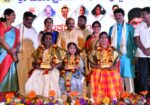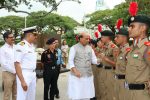The SDGs are a comprehensive list of 17 Global Goals and 169 associated targets, which integrate economic, social and environmental dimensions of development. The SDGs were adopted by 193 countries including India at the UN Sustainable Development Summit in September 2015 which came into effect on 1st January 2016 and are to be achieved by end of 2030. The Ministry of Statistics and Programme Implementation (MoSPI) has developed a National Indicator Framework (NIF) consisting of 306 country specific indicators in consultation with various Ministries for monitoring of progress on the SDGs. MoSPI has prepared the Baseline Report of NIF to assess the present status of SDGs which includes the status of women and child development in the country. The report is available on the website of MoSPI (www.mospi.gov.in).
The SDGs are addressed in the national development agenda of the Government of India which are being implemented through various development schemes/programmes. NITI Aayog has done the mapping of all the SDGs and associated targets with the Central Ministries, Centrally Sponsored and Central Sector Schemes as well as major government initiatives. Central Ministries are striving to achieve the SDG targets by 2030 through the implementation of different development schemes in collaboration with the State Governments and Union Territories. Ministry of Women and Child Development has taken several efforts through policy implementation and schematic interventions in this direction. Major schemes of the Ministry are as follows:
(i) Anganwadi Services Scheme is a unique programme for early childhood care and development. It offers a package of six services, viz. Supplementary Nutrition, Pre-School Non-Formal Education, Nutrition and Health Education, Immunization, Health Check-Up and Referral Services. The beneficiaries under the Scheme are children in the age group of 0-6 years, pregnant women and lactating mothers.
(ii) PoshanAbhiyaan (National Nutrition Mission) targets to reduce the level of stunting, under-nutrition, anemia and low birth weight babies by reducing mal-nutrition/under nutrition, anemia among young children as also, focus on adolescent girls, pregnant women and lactating mothers.
(iii) Pradhan MantriMatruVandanaYojana (PMMVY) scheme provides cash incentive amounting to Rs. 5,000 in three instalments directly to the Bank/Post Office Account of Pregnant Women and Lactating Mother(PW&LM) in DBT Mode during pregnancy and lactation in response to individual fulfilling specific conditions.
(iv) Scheme for Adolescent Girls aims at out of school girls in the age group 11-14, to empower and improve their social status through nutrition, life skills and home skills. The scheme has nutritional and non nutritional components which include nutrition, iron and folic acid supplementation, health check up and referral service, nutrition and health education mainstreaming out of school girls to join formal schooling, bridge course/ skill training, life skill education, home management etc, counselling/ guidance on accessing public services.
(v) National Creche Scheme provides day care facilities to children of age group of 6 months to 6 years of working women. The facilities are provided for seven and half hours a day for 26 days in a month. Children are provided with supplementary nutrition, early childcare education, and health and sleeping facilities.
(vi) Child Protection Services Scheme aims to contribute to the improvement in the well-being of children in difficult circumstances, as well as, reduction of vulnerabilities to situation and actions that leads to abuse, neglect, exploitation, abandonment and separation of children from parent. The Scheme aims to spread awareness regarding the ways and means to prevent all children from child abuse of any kind including child sexual abuse.
(vii) Mahila Shakti Kendra scheme empowers rural women through community participation by involvement of Student Volunteers. The scheme is envisaged to work at various levels. At the national and state level, technical support to the respective government on issues related to women is provided.
(viii) SwadharGreh scheme targets the women victims of unfortunate circumstances who are in need of institutional support for rehabilitation so that they could lead their life with dignity.
(ix) Ujjawala is a comprehensive scheme to combat trafficking with the objective to prevent trafficking of women and children for commercial sexual exploitation, to facilitate rescue victims and placing them in safe custody, to provide rehabilitation services by providing basic amenities/needs, to facilitate reintegration of victims into the family and society, to facilitate repatriation of cross border victims.
(x) Working Women Hostel aims at providing safe and affordable accommodation to working women. These hostels have Day care facility for the children of inmates too. The Ministry provides financial support for establishing such hostels by NGOs or State Governments.
(xi) BetiBachaoBetiPadhao (BBBP) scheme is a tri-ministerial initiative of Ministries of Women and Child Development, Health & Family Welfare and Human Resource Development with a focus on awareness and advocacy campaign for changing mindsets, multi-sectoral action in select districts, enabling girls’ education and effective enforcement of Pre-Conception & Pre Natal Diagnostic Techniques (PC&PNDT) Act. The specific objectives of the scheme include preventing gender biased sex selective elimination; ensuring survival and protection of the girl child and ensuring education and participation of the girl child.
(xii) One Stop Centre (OSC) facilitates access to an integrated range of services including police, medical, legal, psychological support and temporary shelter to women affected by violence. The Scheme is funded through Nirbhaya Fund.
(xiii) Women Helpline – The Scheme is being implemented since 1st April, 2015 to provide 24 hours emergency and non-emergency response to women affected by violence through referral and information about women related government schemes/programmes across the country through a single uniform number (181).
This information was given by the Union Minister of Women and Child Development, Smriti Zubin Irani, in written reply in the Rajya Sabha today.





